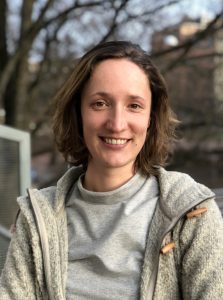Ellen de Paepe, tohtorikoulutettava Gentin yliopistosta Belgiasta, vieraili Fin-HIT-ryhmässä. Lue hänen kuulumisensa englanniksi.
Visiting researcher from Ghent
 Research is all about learning. Sometimes the best way to learn is to pack your backs and travel to meet somebody who knows the topic well. This is what Ellen de Paepe, a doctoral student from Belgium, did. In February, she visited the Fin-HIT research group for two weeks to learn about the microbiome analysis.
Research is all about learning. Sometimes the best way to learn is to pack your backs and travel to meet somebody who knows the topic well. This is what Ellen de Paepe, a doctoral student from Belgium, did. In February, she visited the Fin-HIT research group for two weeks to learn about the microbiome analysis.
Ellen, tell us little bit about yourself.
I am currently performing my PhD studies at the Faculty of Veterinary Medicine in the University of Ghent, and my research topic is cow’s milk allergy in children. I graduated as a Master of Veterinary Sciences, but decided not to pursue a career as a veterinarian as I realized during my internships that the work was not satisfying me. Instead, I decided to become a researcher. In my free time, I like cycling and enjoy being around animals, such as my own horse (Lovely Girl) and my sister’s dog (Maurice).
What motivated you to choose your topic?
A couple of years ago, I was falsely diagnosed with several food allergies, including cow’s milk allergy, which had a serious impact on my life and the people close to me. This experience made me think about the consequences of a food allergy diagnosis for very small children. Because cow’s milk allergy is the first allergy in young children, I chose it as my PhD topic.
What have you learnt here?
I joined the Fin-HIT group to learn more about the analysis of the microbiome. It is known that the bacterial population in the gut is related to the development of food allergies, and therefore we (my research group in Ghent) would like to study the microbiome in the stool samples we have collected from allergic children.
Thank you, Ellen, it was a pleasure to have you here!
